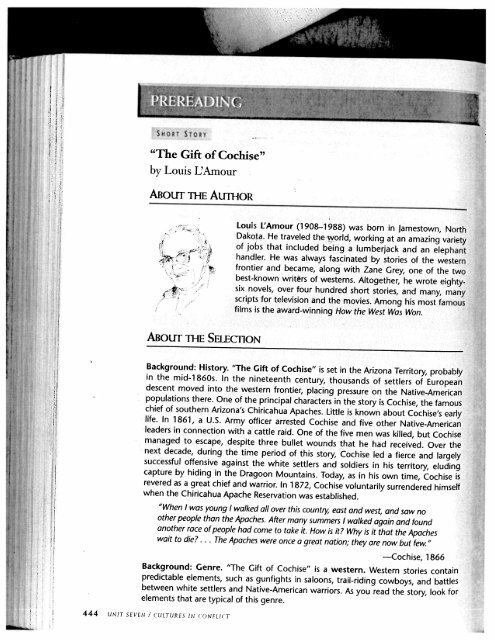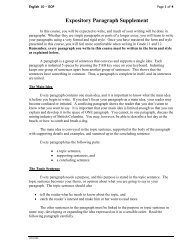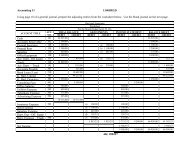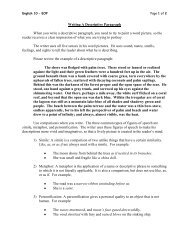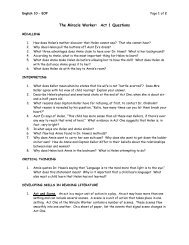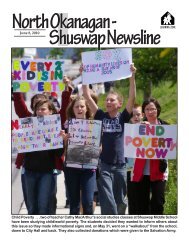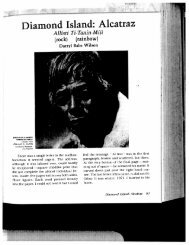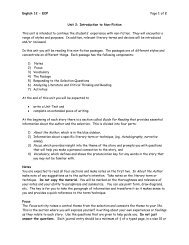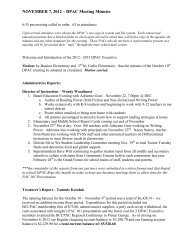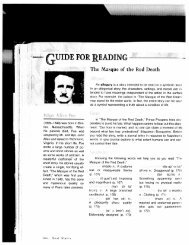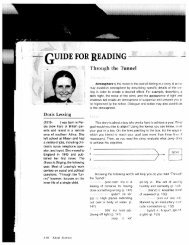You also want an ePaper? Increase the reach of your titles
YUMPU automatically turns print PDFs into web optimized ePapers that Google loves.
SHGT STRv<br />
“<strong>The</strong> <strong>Gift</strong> <strong>of</strong> <strong>Cochise</strong>”<br />
by Louis L’Amour<br />
ABouT mi AuThoR<br />
ABOUT THE SELECHON<br />
Louis L’Amour (1908—1988) was born in Jamestown, North<br />
Dakota. lie traveled the world, working at an amazing variety<br />
<strong>of</strong> jobs that included being a lumberjack and an elephant<br />
handler. He was always fascinated by stories <strong>of</strong> the western<br />
frontier and became, along with Zane Grey, one <strong>of</strong> the two<br />
best-known writers <strong>of</strong> westerns. Altogether, he wrote eighty-<br />
six novels, over four hundred short stories, and many, many<br />
scripts for television and the movies. Among his most famous<br />
films is the award-winning How the West Was Won.<br />
Background: History. “<strong>The</strong> <strong>Gift</strong> <strong>of</strong> <strong>Cochise</strong>” is set in the Arizona Territory, probably<br />
in the mid-i 860s. In the nineteenth century, thousands <strong>of</strong> settlers <strong>of</strong> European<br />
descent moved into the western frontier, placing pressure on the Native-American<br />
populations there. One <strong>of</strong> the principal characters in the story is <strong>Cochise</strong>, the famous<br />
chief <strong>of</strong> southern Arizona’s Chiricahua Apaches. Little is known about <strong>Cochise</strong>’s early<br />
life. In 1861, a U.S. Army <strong>of</strong>ficer arrested <strong>Cochise</strong> and five other Native-American<br />
leaders in connection with a cattle raid. One <strong>of</strong> the five men was killed, but <strong>Cochise</strong><br />
managed to escape, despite three bullet wounds that he had received. Over the<br />
next decade, during the time period <strong>of</strong> this story, <strong>Cochise</strong> led a fierce and largely<br />
successful <strong>of</strong>fensive against the white settlers and soldiers in his territory, eluding<br />
capture by hiding in the Dragoon Mountains. Today, as in his own time, <strong>Cochise</strong> is<br />
revered as a great chief and warrior. In 1872, <strong>Cochise</strong> voluntarily surrendered himself<br />
when the Chiricahua Apache Reservation was established.<br />
“When I was young I walked all over this country, east and west, and saw no<br />
other people than the Apaches. After many summers I walked again and found<br />
another race <strong>of</strong> people had come to take it. How is it? Why is it that the Apaches<br />
wait to die?... <strong>The</strong> Apaches were once a great nation; they are now but few”<br />
—<strong>Cochise</strong>, 1866<br />
Background: Genre. “<strong>The</strong> <strong>Gift</strong> <strong>of</strong> <strong>Cochise</strong>” is a western. Western stories contain<br />
predictable elements, such as gunfights in saloons, trail-riding cowboys, and battles<br />
between white settlers and Native-American warriors. As you read the story, look for<br />
elements that are typical <strong>of</strong> this genre.<br />
444 UNIT SEVEN / CULTURES IN (QNFLI( T
T ense,<br />
READER’S JOURNAL<br />
How can people from vastly different cultures learn to admire and<br />
respect one another? Think <strong>of</strong> some part <strong>of</strong> a culture foreign to yours<br />
that you admire or respect. In your journal, write about what you admire<br />
or respect about that culture and vhv<br />
jj fr—4j<br />
I he <strong>Gift</strong> <strong>of</strong> <strong>Cochise</strong><br />
and white to the lips, Angie<br />
Lowe stood in the door <strong>of</strong> her<br />
cabin with a double-barreled shot gun<br />
in her hands. Beside the door was a<br />
Winchester ‘73,1 and on the table inside<br />
the house were two Walker Colts.<br />
2<br />
Facing the cabin were twelve<br />
Apaches on ragged calico ponies, and<br />
one <strong>of</strong> the Indians had lifted his hand<br />
palm outward. <strong>The</strong> Apache sitting on<br />
the white-splashed bay pony was<br />
<strong>Cochise</strong>.<br />
Beside Angie were her sevenyear-old<br />
son, Jimmy, and her fiveyear-old<br />
daughter, Jane.<br />
<strong>Cochise</strong> sat on his pony in silence.<br />
His black, unreadable eyes studied the<br />
woman, the children, the cabin, and<br />
the small garden. He looked at the two<br />
ponies in the corral and the three<br />
Cows. His eyes strayed to the small<br />
stack <strong>of</strong> hay cut from the meadow and<br />
to the few steers farther up the canyon.<br />
Three times the warriors <strong>of</strong> <strong>Cochise</strong><br />
had attacked this solitary cabin, and<br />
three times they had been turned back.<br />
In all, they had lost seven men, and<br />
three had been wounded. Four ponies<br />
Louis LA1louR<br />
had been killed. His braves reported<br />
that there was no man in the house,<br />
only a woman and two children, so<br />
<strong>Cochise</strong> had come to see for himself this<br />
woman who was so certain a shot with<br />
a rifle and who killed his fighting men.<br />
<strong>The</strong>se were some <strong>of</strong> the same fight<br />
ing men who had outfought, outguessed,<br />
and outrun the finest<br />
American army on record, an army<br />
outnumbering the Apaches by a hun<br />
dred to one. Yet a lone woman with<br />
two small children had fought them<br />
<strong>of</strong>f, and the woman was scarcely more<br />
than a girl. And she was prepared to<br />
fight now. <strong>The</strong>re was a glint <strong>of</strong> admi<br />
ration in the old eyes that appraised<br />
her. <strong>The</strong> Apache was a fighting man,<br />
and he respected fighting blood.<br />
“Where is your man?”<br />
“He has gone to El Paso.” Angie’s<br />
voice was steady, but she was fright<br />
ened as she had never been before. She<br />
recognized <strong>Cochise</strong> from descriptions,<br />
and she knew that if he decided to kill<br />
1. Vinchester ‘73. Type <strong>of</strong> rifle that can repeat shots<br />
s irhout reloading<br />
2. VaIker Colts. hpes <strong>of</strong> reo1vers or handguns<br />
1,<br />
Why does <strong>Cochise</strong><br />
go to this<br />
particular cabin?<br />
Why does <strong>Cochise</strong><br />
respect this<br />
woman?<br />
SHORT S FORY THE IFT OF 1 O( 01SF’ 445<br />
I<br />
I
Why does A,’q<br />
hesitate? What<br />
does the fact that<br />
che answers the<br />
question reveal<br />
about he,? What<br />
does <strong>Cochise</strong>’s<br />
answer reveal<br />
about him? Is he<br />
a sentimental<br />
man?<br />
446<br />
or capture her it would he done. Until<br />
now, the sporadic’ attacks she had<br />
fought <strong>of</strong>f had been those <strong>of</strong> casual<br />
hands <strong>of</strong> warriors who raided her in<br />
passing.<br />
“lie has been gone a long time. I low<br />
longs<br />
Angie hesitated, hut it was not in her<br />
to lie. “lie has heen gone four months.’<br />
<strong>Cochise</strong> considered that. \o one but<br />
a fool would leave such a woman and<br />
such fine children. Only one thing<br />
could have prevented his return. “Your<br />
man is dead,” he said.<br />
Angie waited, her heart pounding<br />
w ith heavy, measured beats. She had<br />
guessed long ago that Ed had been<br />
killed, but the way <strong>Cochise</strong> spoke did<br />
not imply that Apaches had killed him,<br />
only that he must be dead or he would<br />
have returned.<br />
“You fight well,” <strong>Cochise</strong> said. “You<br />
have killed my young men.”<br />
“Your young men attacked me.” She<br />
hesitated, then added, “<strong>The</strong>y stole m<br />
horses.”<br />
“YOur man is gone. ‘Vhv do you not<br />
leaves<br />
Angie looked at him with surprise.<br />
“Leave? Why, this is my home. This<br />
land is mine. This spring is mine. I<br />
shall not leave.”<br />
“This was an Apache spring,’<br />
Coch i se reminded her reasonably.<br />
“‘[‘he Apache lives in the inoun—<br />
tains.” Angie replied. “lie does not<br />
need this spring. I have two children,<br />
and 1(10 need it.’<br />
“l3ut when the Apache COniCS this<br />
was, where shall he drinks I us throat<br />
is dry and \ ou keep him from water.”<br />
‘‘OR1Js FOR<br />
EVFRYDAY Usc:<br />
<strong>The</strong> very fact that <strong>Cochise</strong> was will<br />
ing to talk raised her hopes. <strong>The</strong>re had<br />
been a time when the Apache made no<br />
war on the white man. “<strong>Cochise</strong> speaks<br />
with a forked tongue,” she said<br />
“<strong>The</strong>re is water yonder.” She gestured<br />
toward the hills, where Ed had told<br />
her there were springs. “But if the<br />
people <strong>of</strong> <strong>Cochise</strong> come in peace. they<br />
may drink at this spring.”<br />
<strong>The</strong> Apache leader smiled faintly.<br />
Such a woman would rear a nation <strong>of</strong><br />
“<strong>The</strong><br />
warriors, lie nodded at Jinimx .<br />
small one—does be also shoot?”<br />
“He does, Angie said proudly, “and<br />
well, too!” She pointed at an upthrust<br />
leaf <strong>of</strong> prickly peal’. “Show them,<br />
jimm.”<br />
<strong>The</strong> prickly pear was an eas two<br />
hundred yards away, and the Win<br />
chester was long and heavy, hut he<br />
lifted it eagerly and steadied it against<br />
the doorjamb as his father had taught<br />
him, held his sight an instant, then<br />
fired. <strong>The</strong> bud on top <strong>of</strong> the prickly<br />
pear disintegrated.<br />
<strong>The</strong>re were grunts <strong>of</strong> appreciation<br />
from the dark—ficed warriors. <strong>Cochise</strong><br />
chuckled.<br />
“<strong>The</strong> little warrior shoots well. It is<br />
well you have no man. ‘bu might raise<br />
an army <strong>of</strong> little warriors to ght my<br />
people.’<br />
“I have no wish to fight your peo<br />
ple. Angie said quietly. “Your people<br />
have your ways, and I have mine. I live<br />
in peace when I am left in peace. I did<br />
not think,” she added with dignity.<br />
“that the great <strong>Cochise</strong> made wai on<br />
women!”<br />
spar . a • dic (spa rad’ik) ad;., occasional<br />
dis • in • te • grate (dis inta grat’) vi., break apart
iTt Apache looked at her, then<br />
turned his pony away. “\Iv people will<br />
trouble yOU flO longer, he said. ‘\ou<br />
are the fl1ot1er <strong>of</strong> a strong son.”<br />
“\\hat about 11W tWO pOfiiCS she<br />
called after him. “Ydur voting men<br />
rook them from me.”<br />
<strong>Cochise</strong> did not turn or look back,<br />
and the little cavalcade <strong>of</strong> riders fol<br />
lowed him away. Angie stepped hack<br />
into the cabin and closed the door.<br />
<strong>The</strong>n she sat down abruptly, her face<br />
white the muscles in her legs trem<br />
bling.<br />
Vhen morning came, she went cau—<br />
tioush to the spring for water. 1—Icr<br />
ponies were back in the corral. <strong>The</strong>y<br />
had been returned (luring the night.<br />
Slowly, the (lays drew on. Angie<br />
broke a small piece <strong>of</strong> the meadow and<br />
planted it. Alone, she cut hay in the<br />
inealow and built another stack. She<br />
saw Indians several times, but they did<br />
not bother her. One morning, when<br />
she opened her door, a quarter <strong>of</strong> ante<br />
lope lay on the step, but no Indian was<br />
in sight. Several times, during the<br />
weeks that followed, she saw moccasin<br />
tracks near the spring.<br />
Once, going out at daybreak, she saw<br />
an Indian girl dipping water from the<br />
spring. Angie called to her, and the girl<br />
turned quickly, facing her. Angie<br />
walked toward her, <strong>of</strong>fering a bright<br />
red silk ribbon. Pleased at the gift, the<br />
Apache girl left.<br />
And the following morning there<br />
Was another quarter <strong>of</strong> antelope on her<br />
step—hut she saw no Indian.<br />
WORDS FOR<br />
EVERDW USE:<br />
shift • less (shiW us) adj., lazy<br />
Ed Lowe had built the cabin in West<br />
Dog Canyon in the spring <strong>of</strong> 1 7 1. but<br />
it uas Angie ho chose the spot, not<br />
Ed. In Santa Fe they would have told<br />
you that Ed Lowe was good—looking,<br />
shiftless, and agreeable. Fle was also,<br />
unfortunately, handy with a pistol.<br />
Angie’s father had come from<br />
County May& to New York and from<br />
\ew \ork to the Mississippi, where he<br />
became a tough, brawling riverboat—<br />
man. In New Orleans, he met a<br />
beautiful Cajun<br />
4 girl and married her.<br />
Together, they started west for Santa<br />
Ee, and Angie was born en route. Both<br />
parents died <strong>of</strong> cholera when Angie<br />
was fourteen. She lived with an Irish<br />
family for the following three years,<br />
then married Ed Lowe when she was<br />
seventeen.<br />
Santa Fe was not good for Ed, and<br />
Angie kept after him until they started<br />
south. It was Apache country, but they<br />
kept on until they reached the old<br />
Spanish ruin in West Dog. Here there<br />
were grass, water, and shelter from the<br />
win(l.<br />
<strong>The</strong>re was fuel, and there were<br />
pinyons and game.<br />
6 And Angie, with<br />
an Irish eye for the land, saw that it<br />
would grow crops.<br />
<strong>The</strong> house itself was built on the<br />
ruins <strong>of</strong> the old Spanish building, using<br />
the thick walls and the floor. <strong>The</strong> loca<br />
tion had been admirably chosen for<br />
. County<br />
Mayo. Counts in Ireland<br />
4. Cajun. Descended from Acadian French immigrants;<br />
a natis e ot Louisiana<br />
. cholera.<br />
Intestinal disease<br />
6 pm’ons and game. pnlvsns—snlaIl pine trees iith<br />
eilihleseds: im —o Id animals and birds that are hunted<br />
F s F<br />
What does the<br />
return <strong>of</strong> the<br />
ponies reveal<br />
about <strong>Cochise</strong>?<br />
F fT )F ( 1HI 447
WhotdWfdLoiw<br />
nibs? IW,y n*ht<br />
kfle<br />
auw<br />
w<strong>of</strong>l hhn<br />
defense. <strong>The</strong> house was built in a cor<br />
ncr <strong>of</strong> the cliff, under the sheltering<br />
overhang, so that approach was possi<br />
ble from cmlv two directions both<br />
covered 1w an easy field <strong>of</strong> fire from<br />
the door and windows.<br />
For seven months, Ed worked hard<br />
and steadili. He put in the first crop.<br />
built the house, and proi ed himself a<br />
handy man with tools, lie repaired the<br />
old plow they had bought, cleaned out<br />
the spring, and paved and walled it<br />
with slabs <strong>of</strong> stone. If he was lonely for<br />
the carefree companions <strong>of</strong> Santa Fe,<br />
he gave no indication <strong>of</strong> it. Provisions<br />
were low, and when he finally started<br />
<strong>of</strong>f to the south, Angie watched him go<br />
with an ache in her heart.<br />
She did not know whether she loved<br />
Ed. <strong>The</strong> first flush <strong>of</strong> enthusiasm had<br />
passed, and Ed Lowe had proved<br />
something less than she had believed.<br />
But he had tried, she admitted. And it<br />
had not been can” for him. He was an<br />
amiable soul, given to whittling and<br />
idle talk, all <strong>of</strong> which he missed in the<br />
loneliness <strong>of</strong> the Apache country. And<br />
when he rode away, she had no idea<br />
whether she would ever see him again.<br />
She never did.<br />
Santa Fe was far and away to the<br />
north, but the growing village <strong>of</strong> El<br />
Paso was less than a hundred miles to<br />
the west, and it was there Ed Lowe<br />
rode for supplies and seed.<br />
lie had several drinks—his first in<br />
months—in one <strong>of</strong> the saloons. As the<br />
liquor warmed his stomach, F4 Lowe<br />
looked around agreeably. For a<br />
448 :.s i i t S I Iki% (fl fg<br />
WoRDs FOR<br />
Ev1ltYD.w USE:<br />
moment, his eves clouded w itli wor<br />
as he thought <strong>of</strong> his vife anti cbiIdr<br />
back in Xpache eountr) but it was not<br />
in Ed Lowe to worry for long, lit had<br />
another drink and leaned on th bar,<br />
talking to the bartender. All Ed had<br />
ever asked <strong>of</strong> life was enough to tat, a<br />
horse to ride, an occasional clrinL and<br />
companions to talk with. Not that he<br />
had anything important to sa>. lie just<br />
liked to talk.<br />
Suddenly a chair grated on the fiooi,<br />
and Ed turned. A lean, powerful man<br />
with a shock <strong>of</strong> uncut black hair and a<br />
torn. weather-tided shirt stood at hay.<br />
Facing him across the table wert. three<br />
hard-faced young men. obviously<br />
brothers.<br />
Ches Lane did not notice Ed Lowe<br />
it atching from the bar. He had eyes<br />
only for the men facing him. “You<br />
done that deliberate!” <strong>The</strong> statement<br />
was a challenge.<br />
<strong>The</strong> broad-chested man on the left<br />
grinned through broken teeth. “That’s<br />
right, Ches. I done it deliberate. Thu<br />
killed Dan Tolliver on the Brazos.”<br />
“He made the quarrel.’ Coinpre<br />
hension came to Ches. He was bo’ied.<br />
and by three <strong>of</strong> the fighting, blood<br />
hungn- Tollivers.<br />
“Don’t make no difference,” the<br />
broad—chested lblliver said. “‘i\ ho<br />
sheds a ‘lblliver’s blood, by a ‘lbllitr<br />
hand must die!”'<br />
Ed Lowe moved suddenly from the<br />
bar. “Three to one is long odds,” he<br />
at bay. nh no J) Ut eaw<br />
S. Braros. Rtwr ii’ Iet,s that flini.. mm the C,ult’<br />
1eiti.<br />
am . I . a. We (ame a bat) a4, friendly
said<br />
1 his voice low and friendly. If the<br />
creflt in the corner is w dim’, III side<br />
jint<br />
1vo loliners turned ton ard him. Ed<br />
Lone nas smiling easily, his hand hov<br />
erifl near his gun. “‘lou stay out <strong>of</strong><br />
this” one <strong>of</strong> the brothers said harshly.<br />
“Fin in,” Ed replied. \Vhv don’t von<br />
boys light a shuck?<br />
“o, bv—r’T he man’s hand<br />
dropped for his gun, and the room<br />
thundered nith sound.<br />
Ed n as smiling easil unvorried as<br />
always. His gun flashed up. Tie felt it<br />
leap in his hand, san the nearest<br />
ThHiver smashed back, and he shot<br />
him again as he dropped. lie had univ<br />
time to see Ches Lane with two guns<br />
out and another Tolliver down, hen<br />
something struck him through the<br />
stomach and he stepped back against<br />
the bar, suddenly sick.<br />
<strong>The</strong> sound stopped, and the room<br />
was quiet. and there was the acrid smell<br />
<strong>of</strong> ponder smoke. Three ibllivers were<br />
down and (lead, and Ed Lowe was<br />
dying. Ches Lane crossed to him.<br />
“Ve got ‘em,” Ed said, “we sure did.<br />
But they got me.”<br />
Suddenly his face changed. “Oh Lord<br />
in heaven, what’ll Angie do?” And then<br />
he crumpled over on the floor and lay<br />
still, the blood staining his shirt afl(l<br />
mingling with the sawdust.<br />
Stiff-faced, Ches looked up. “Who<br />
was Angie?” he asked.<br />
“His n ife,” the bartender told him.<br />
“She’s up northeast somewhere, in<br />
Apache country. He was tellin’ me<br />
about her. Iwo kids, too.”<br />
FOR<br />
EvrRy[)A Usr<br />
1<br />
ac rid (akrid) ad!., stinging<br />
Ches Lane stared down at the crum—<br />
pied, used—uf) body <strong>of</strong> Ed Lowe. <strong>The</strong><br />
man had saved his life.<br />
One he could have beaten; two he<br />
might have beaten; three would have<br />
killed him. Ed Lowe, stepping in when<br />
. Iiitht<br />
II shuck. \ hn 1. th2 In .i len ii 1 ni ppetl an<br />
rIm .1 tar a C’ II. urn I. lIlirn inirti il I<br />
tErn. in n Ni I rth, riilin<br />
fl Cii ‘!i tIlil 111211 .11<br />
0 ‘hr it if<br />
What does it say<br />
about Ed that he<br />
remembers Angie<br />
only after the<br />
fight?<br />
449
What do others<br />
say about Ches<br />
Lanes chances <strong>of</strong><br />
finding Angie?<br />
Why do the<br />
Apaches come to<br />
admire Ches?<br />
he did, had saved the life <strong>of</strong> Ches<br />
Lane.<br />
For more than three months, when<br />
ever he could rustle the grub, Ches<br />
Lane quartered the country over and<br />
back. <strong>The</strong> trouble was, he had no lead<br />
to the location <strong>of</strong> Ed Lowe’s home<br />
stead. An examination <strong>of</strong> Ed’s horse<br />
revealed nothing. Lowe had bought<br />
seed and ammunition. <strong>The</strong> seed indi<br />
cated a good water supply, and the<br />
ammunition implied trouble. But in<br />
the country there was always trouble.<br />
A man had died to save his life, and<br />
Ches Lane had a deep sense <strong>of</strong> obliga<br />
tion. Somewhere that wife waited, if<br />
she was still alive, and it was up to him<br />
to find her and look out for her. He<br />
rode northeast, cutting for sign, but<br />
found none. Sandstorms had wiped<br />
Out any hope <strong>of</strong> back-trailing Lowe.<br />
Actually, West Dog Canyon was more<br />
east than north, but this he had no way<br />
<strong>of</strong> knowing.<br />
450 LI\IT LV\ ( rllkFs 1\<br />
“He didn’t say where”<br />
Ches Lane shoved his hat hack on<br />
his head. “XVhat’s northeast <strong>of</strong> hereE”<br />
<strong>The</strong> bartender rested his hands on<br />
the bar. “<strong>Cochise</strong>,” he said.<br />
North he went, skirting the rugged<br />
San Andreas Mountains. Heat baked<br />
him hot; dry winds parched his skin.<br />
His hair grew dry and stiff and<br />
alkali—whitened, lie rode north, and<br />
soon the Apaches knew <strong>of</strong> him. He<br />
fought them at a lonely water hole, and<br />
he fought them on the run. <strong>The</strong>y killed<br />
his horse, and he switched his saddle to<br />
the spare and rode on. <strong>The</strong>y cornered<br />
him in the rocks, and he killed two <strong>of</strong><br />
them and escaped Iw night.<br />
<strong>The</strong>y trailed him through the White<br />
Sands, and he left two more for dead.<br />
He fought fiercely and bitterl and<br />
would not be turned from his uest,<br />
I Ic turned east through the la a beds<br />
and still more east to the Pecos. He<br />
saw only two white men, and m:ither<br />
knew <strong>of</strong> a white oman.<br />
‘<strong>The</strong> bearded man laughed harshly,<br />
“A woman alone She wouldn’t last a<br />
month! By now the Apaches got her,<br />
or she’s dead. Don’t be a fool! Leave<br />
this country before you die here,”<br />
Lean, wind-whipped, and savage,<br />
Ches Lane pushed on. <strong>The</strong> Mes<br />
0 cornered him in Rawhide<br />
caleros’<br />
Draw, and he fought them to a stand<br />
still. Grimly, the Apaches clung to his<br />
trail.<br />
<strong>The</strong> sheer determination <strong>of</strong> the man<br />
fascinated them. Bred and horn in a<br />
rugged and lonely land, the paches<br />
knew the difficulties <strong>of</strong> survial; they<br />
knew how a man could live, how he<br />
must live. Even as they tried to kill this<br />
man, they loved him, for he was one <strong>of</strong><br />
their own.<br />
Lane’s jeans grew ragged. Two bullet<br />
holes were added to the old black hat.<br />
<strong>The</strong> slicker was torn; the saddle, so<br />
carefully kept until now, was scratched<br />
l)V gravel and brush. At night he<br />
cleaned his guns, and by day he<br />
scouted the trails. Three times he<br />
found lonely ranch houses burned to<br />
the ground, the buzzard- and (ovote<br />
stripped bones <strong>of</strong> their owners lying<br />
nearby.<br />
C)nce he found a covered wagon, its<br />
canvas flopping in the wind, a man<br />
lying sprawled on the seat with a tol<br />
near his hand. He was dead and his<br />
wife was dead, and their canteens rat<br />
tled like empty skulls.<br />
scaicros. \pahL ei md ‘\ w
Le mer every day, Ches Lane pushed<br />
on. tie camped one night in a canyon<br />
near some white oaks. He heard a ho<strong>of</strong><br />
click on stone, and he backed away<br />
from his tiny fIre, gun in hand.<br />
<strong>The</strong> riders were white men, and<br />
there were two <strong>of</strong> them. Joe Trnpkins<br />
and Wiley Lynn were headed west,<br />
and Ches Lane could have guessed<br />
why. l’hey were men he had known<br />
before, and he told them what he was<br />
doing.<br />
Lynn chuckled. He was a thin-faced<br />
man with lank yellow hair and dirty<br />
fingers. “Seems a mighty strange way<br />
to get a woman. <strong>The</strong>re’s some as<br />
comes easier.”<br />
“This ain’t for fun,” Ches replied<br />
shortly, “I got to find her.”<br />
Tompkins stared at him. “Ches,<br />
you’re crazy! That gent declared him<br />
self in <strong>of</strong> his own wish and desire. Far’s<br />
that goes, the gal’s dead. No woman<br />
could last this long in Apache coun<br />
try.”<br />
At daylight, the two men headed<br />
west, and Ches Lane turned south....<br />
<strong>The</strong> lonely rider who fought so des<br />
perately and knew the desert so well<br />
soon became a subject <strong>of</strong> gossip among<br />
the Apaches. Over the fires <strong>of</strong> many a<br />
rancheria they discussed this strange<br />
rider u ho seemed to be going nowhere<br />
but always riding, like a lean wolf dog<br />
on a trail. He rode across the mesas<br />
and down the canyons; he studied<br />
signs at every water hole; he looked<br />
long from every ridge. It was obvious<br />
to the Indians that he searched for<br />
something_hut what?<br />
<strong>Cochise</strong> had come again to the cabin<br />
in West Dog Canyon. “Little warrior<br />
too small,” he said, “too small for<br />
hunt. You ioin my people. Take<br />
Apache for man.”<br />
“No.” Angie shook her head.<br />
“Apache ways are good for the Apache,<br />
and the white man’s ways are good for<br />
white men—and women.”<br />
<strong>The</strong>y rode away and said no more,<br />
but that night, as she had on many<br />
other nights after the children were<br />
asleep, Angie cried. She wept silently,<br />
her head pillowed on her arms. She<br />
was as pretty as ever, but her face was<br />
thin, showing the worry and struggle<br />
<strong>of</strong> the months gone by, the weeks and<br />
months without hope.<br />
<strong>The</strong> crops were small but good.<br />
Little Jimmy worked beside her. At<br />
night, Angie sat alone on the steps and<br />
watched the shadows gather down the<br />
long canyon, listening to the coyotes<br />
yapping from the rim <strong>of</strong> the Guad<br />
alupes,” hearing the horses blowing in<br />
the corral. She watched, still hopeful,<br />
but now she knew that <strong>Cochise</strong> was<br />
right: Ed would not return.<br />
But even if she had been ready to<br />
give up this, the first home she had<br />
known, there could be no escape. Here<br />
she was protected by <strong>Cochise</strong>. Other<br />
Apaches from other tribes would not<br />
so willingly grant her peace.<br />
At daylight she was up. <strong>The</strong> morning<br />
air was bright and balmy, but soon it<br />
would be hot again. Jimmy went to the<br />
spring for water, and when breakfast<br />
ras over, the children played while<br />
Angie sat in the shade <strong>of</strong> a huge, old<br />
cottonwood and sewed. It was a<br />
Sunday, warm and lovely. From time<br />
to time, she lifted her eyes to look<br />
down the canyon, half smiling at her<br />
own foolishness.<br />
11. Guadalupes. Mountain range in Texas md New<br />
\lesico<br />
What does<br />
Angies face<br />
show?<br />
Why can’t Angie<br />
leave her home?<br />
RT STOR 1HF IFT OF ( 0101SF 451
Why might Angie<br />
have chosen this<br />
particular<br />
passage to read?<br />
452<br />
<strong>The</strong> hard-packed earth <strong>of</strong> the yard<br />
was swept clean <strong>of</strong> dust; the pans<br />
hanging on the kitchen wall were neat<br />
and shining. <strong>The</strong> children’s hair had<br />
been clipped, and there was a small<br />
bouquet on the kitchen table.<br />
After a while, Angie put aside her<br />
sewing and changed her dress. She did<br />
her hair carefully, and then, looking in<br />
her mirror, she reflected with sudden<br />
pain that she was pretty and that she<br />
was only a girl.<br />
Resolutely, she turned from the mir<br />
ror and, taking up her Bible, went back<br />
to the seat under the cottonwood. <strong>The</strong><br />
children left their playing and came to<br />
her, for this was a Sunday ritual, their<br />
only one. Opening the Bible, she read<br />
slowly,<br />
“Though I walk through the valley<br />
<strong>of</strong> the shadow <strong>of</strong> death, I will fear no<br />
evil; for thou art with me; thy rod and<br />
thy staff, they comfort me. Thou pre<br />
parest a tal)le before me in the<br />
presence <strong>of</strong> mine enemies: thou . .<br />
“A’Iommy.” jimmy tugged at her<br />
sleeve. “Look!”<br />
Ches Lane had reached a narrow<br />
canyon by midafternoon and decided<br />
to make camp. <strong>The</strong>re was small possi<br />
bilitv he would find another such spot,<br />
and he was dead tired, his muscles sod<br />
den with fatigue. <strong>The</strong> canyon was one<br />
<strong>of</strong> those unexpected gashes in the cap<br />
rock that gave no indication <strong>of</strong> its<br />
presence until you came right on it.<br />
After some searching, Ches found a<br />
route to the bottom and made camp<br />
under a wind—hollowed overhang.<br />
WORDS FOR<br />
EvERYDAY USE:<br />
<strong>The</strong>re was water, and there v,as a small<br />
patch <strong>of</strong> grass.<br />
After his horse had a drink and a roll<br />
on the ground, it began cropping<br />
eagerly at the rich, green grass, and<br />
Ches built a smokeless fire <strong>of</strong> some<br />
ancient driftwood in the canyon hot<br />
torn. It was his first hot meal in days,<br />
and when he had finished he put out<br />
his fire, rolled a smoke, and leaned<br />
back contentedly.<br />
Before darkness settled, he climbed<br />
to the rim and looked over the coun<br />
try. <strong>The</strong> sun had gone down, and the<br />
shadows were growing long. fter a<br />
half-hour <strong>of</strong> study, he decided there<br />
was no living thing within miles,<br />
except for the usual desert life.<br />
Returning to the bottom, he moved<br />
his horse to fresh grass, then rolled in<br />
his blanket. For the first time in a<br />
month, he slept without fear.<br />
He woke up suddenly in the broad<br />
daylight. <strong>The</strong> horse was listening to<br />
something, his head up. Swifth, Ches<br />
went to the horse and led it back under<br />
the overhang. <strong>The</strong>n he drew on his<br />
boots, rolled his blankets, and saddled<br />
the horse. Still he heard no sound.<br />
Climbing the rim again, he studied<br />
the desert and found nothing. Return<br />
ing to his horse, he mounted up and<br />
rode down the canyon toward the flat-<br />
land beyond. Coming out <strong>of</strong> the<br />
canyon mouth, he rode right into the<br />
middle <strong>of</strong> a war party <strong>of</strong> more than<br />
twenty Apaches—invisible until sud<br />
denlv they stood up behind rocks,<br />
their rifles leveled. And he didni have<br />
a chance.<br />
res .0 • lute. fy(reza ie(’Ie) adv., firmly, determinedly<br />
fa • tigue (fa teg’) n., physical or mental exhaustion<br />
I<br />
A I<br />
I
1. they hound his wrists to the<br />
swut<br />
saddle horn and tied his Feet. Only<br />
then (lid he see the man who led the<br />
party. It was <strong>Cochise</strong>.<br />
as a lean, wiry Indian <strong>of</strong> past<br />
fifty. his black hair streaked with gray.<br />
his features strong and clean—cut. He<br />
stared at I iane, and there was nothing<br />
in his face to reveal what he might he<br />
thinking.<br />
Several <strong>of</strong> the younger warriors<br />
pushed forward, talking excitedly and<br />
waving their arms. Ches Lane under—<br />
stoOd some <strong>of</strong> it, but he sat straight in<br />
the saddle, his head up, waiting. <strong>The</strong>n<br />
<strong>Cochise</strong> spoke and the party turned,<br />
and, leading his horse, they rode away.<br />
<strong>The</strong> nules grew long and the sun was<br />
hot. He was <strong>of</strong>fered no water and he<br />
asked for none. <strong>The</strong> Indians ignored<br />
him. Once a young brave rode near<br />
and struck him viciously. Lane made<br />
no sound, gave no indication <strong>of</strong> pain.<br />
When they finally stopped, it was<br />
beside a huge anthill swarming with<br />
big red desert ants.<br />
Roughly, they quickly untied him<br />
and jerked him from his horse. He dug<br />
in his heels and shouted at them in<br />
Spanish: “<strong>The</strong> Apaches are women!<br />
<strong>The</strong>y tie me to the ants because they<br />
are afraid to fight me!”<br />
An Indian struck him, and Ches<br />
glared at the man. If he must die, he<br />
would show them how it should be<br />
done. Yet he knew the unpredictable<br />
nature <strong>of</strong> the Indian, <strong>of</strong> his great<br />
respect for courage.<br />
“Gi’ e me a knife, and I’ll kill any <strong>of</strong><br />
your warriors!”<br />
WORDS FOR<br />
EvERDAy USE:<br />
<strong>The</strong>y stared at him, and one power<br />
fully built Apache angrily ordered<br />
them to get on with it. <strong>Cochise</strong> spoke,<br />
and the hig warrior replied angrily<br />
Ches Lane nodded at the anthill. “Is<br />
this the death for a Fihting man I<br />
have fought your strong men and<br />
beaten them. I have left no trail for<br />
them to follow and for months I have<br />
lived among you, and now only by<br />
accident have you captured me. Give<br />
me a knife,” he added grimly, “and I<br />
will fight him!” lie indicated the big,<br />
black-faced Apache.<br />
<strong>The</strong> warrior’s cruel mouth hardened,<br />
and he struck Ches across the face.<br />
<strong>The</strong> white man tasted blood and<br />
fury. “Woman!” Ches said. “Coyote!<br />
You are afraid!” Ches turned on<br />
<strong>Cochise</strong>, as the Indian stood irresolute.<br />
“Free my hands and let me fight!” he<br />
demanded. “If I win, let me go free.”<br />
<strong>Cochise</strong> said something to the big<br />
Indian. Instantly, there was stillness.<br />
<strong>The</strong>n an Apache sprang forward and,<br />
with a slash <strong>of</strong> his knife, freed Lane’s<br />
hands. Shaking loose the thongs, Ches<br />
Lane chafed his wrists to bring hack the<br />
circulation. An Indian threw a knife at<br />
his feet. It was his own howie knife.<br />
Ches took <strong>of</strong>f his riding hoots. In<br />
sock feet, his knife gripped low in his<br />
hand, its cutting edge up, he looked at<br />
the big warrior.<br />
“I promise you nothing,” <strong>Cochise</strong><br />
said in Spanish, “but an honorable<br />
death.”<br />
ire res • o • lute (ir rzaI) adj., undecided<br />
<strong>The</strong> big warrior came at him on cat<br />
feet. Warily, Ches circled. He had not<br />
only to defeat this Apache but to<br />
Why does Ches<br />
belfr.e he shoula<br />
be allowed to<br />
r9ht for his<br />
freedom?<br />
(1 I, s 453
E<br />
What does Ches<br />
do when he has<br />
the advantage<br />
over the Apache<br />
warrior?<br />
What did Chea<br />
hope? What<br />
happens instead?<br />
WI’, —<br />
escape. He permitted himself a side<br />
glance toward his horse. It stood<br />
alone. No Indian held it.<br />
<strong>The</strong> Apache closed swifth thrusting<br />
wickedly with the knife. Ches, who<br />
had learned knife fighting in the bayou<br />
country <strong>of</strong> Louisiana, turned his hip<br />
sharply, and the blade slid past him.<br />
He struck swiftly, but the Apache’s for<br />
ward movement deflected the blade,<br />
and it failed to penetrate. However, as<br />
it swept up between the Indian’s body<br />
and arm, it cut a deep gash in the war<br />
rior’s left armpit.<br />
<strong>The</strong> Indian sprang again, like a claw<br />
ing cat, streaming blood. Ches moved<br />
aside, but a backhand sweep nicked<br />
him, and he felt the sharp bite <strong>of</strong> the<br />
blade. Turning, he paused on the balls<br />
<strong>of</strong> his feet.<br />
He had had no water in hours. His<br />
lips were cracked. Yet he sweated now,<br />
and the salt <strong>of</strong> it stung his eyes. He<br />
stared into the malevolent black eyes<br />
<strong>of</strong> the Apache, then moved to meet<br />
him. <strong>The</strong> Indian lunged, and Ches<br />
sidestepped like a boxer and spun on<br />
the ball <strong>of</strong> his foot.<br />
<strong>The</strong> sudden side step threw the<br />
Indian past him, but Ches failed to<br />
drive the knife into the Apache’s kid<br />
ney when his foot rolled on a stone.<br />
<strong>The</strong> point left a thin red line across<br />
the Indian’s back. <strong>The</strong> Indian was<br />
quick. Before Ches could recover his<br />
balance, he grasped the white man’s<br />
knife wrist. Desperately, Ches grabbed<br />
for the Indian’s knife hand and got the<br />
wrist, and they stood there straining,<br />
chest to chest.<br />
V t<br />
454 LI.\IT EiE\ ( LILT LIRE ; U \F I<br />
WORDS FOR<br />
Seeing his chance, Ches suddenly’ let<br />
his knees buckle, then brought up his<br />
knee and fell back, throwing the<br />
Apache over his head to the sand.<br />
Instantly, he whirled and was on his<br />
feet. standing over the Apache. <strong>The</strong><br />
warrior had lost his knife, and he lay<br />
there, staring up, his eyes black with<br />
hatred.<br />
Coolly, Ches stepped back, picked up<br />
the Indian’s knife, and tossed it to him<br />
contemptuously. <strong>The</strong>re was a grunt<br />
from the watching Indians, and then<br />
his antagonist rushed. But loss <strong>of</strong><br />
blood had weakened the warrior, and<br />
Ches stepped in swiftly, struck the<br />
blade aside, then thrust the point <strong>of</strong> his<br />
blade hard against the Indian’s belly.<br />
Black eyes glared into his without<br />
yielding. A thrust, and the man would<br />
be disemboweled,<br />
12 but Ches stepped<br />
back. “He is a strong man,” Ches said in<br />
Spanish. “It is enough that I have won.”<br />
Deliberately, he walked to his horse<br />
and swung into the saddle. He looked<br />
around, and every rifle covered him.<br />
So he had gained nothing. He had<br />
hoped that mercy might lead to mercy,<br />
that the Apache’s respect for a fighting<br />
man would win his freedom. He had<br />
failed. Again they bound him to his<br />
horse, but they did not take his knife<br />
from him.<br />
When they camped at last, he was<br />
given food and drink. He was bound<br />
again, and a blanket was thrown over<br />
him. At daylight they were again in the<br />
12. disemboweled. 1 Ia; ing had the inner organs <strong>of</strong>t1i<br />
abdomen remo;<br />
de ‘ flect (dé fiekt’) vt., turn to one side<br />
ma . 1ev • o’ lent (ma lev’a lant) adj., wishing evil or harm to otherS<br />
EVERYDAY USE: COn’ temp • tu • otis . ly (kan temp’ch as lé) adv., scornfully<br />
an’ tag • on • 1st (an tag’a fist) 17., opponent
j<br />
saddle. In Spanish he asked where they<br />
were taking him, but they gave no<br />
indication <strong>of</strong> hearing. When they<br />
stopped again, it was beside a pole cor<br />
ral. near a stone cabin.<br />
When Jimmy spoke, Angie got<br />
quickly to her feet. She recognized<br />
Coehise with a start <strong>of</strong> relief, but she<br />
sav instantly that this was a war party.<br />
And then she saw the prisoner.<br />
<strong>The</strong>ir eyes met and she felt a distinct<br />
shock. He was a white man, a big,<br />
unshaven man who badly needed both<br />
a bath and a haircut, his clothes ragged<br />
and bloody. <strong>Cochise</strong> gestured at the<br />
prisoner.<br />
“No take Apache man, you take<br />
white man. This man good for hunt,<br />
good for fight. He strong warrior. You<br />
take ‘em.”<br />
Flushed and startled, Angie stared at<br />
the prisoner and caught a faint glint <strong>of</strong><br />
humor in his dark eyes.<br />
“Is this here the fate worse than death<br />
I hear tell <strong>of</strong>?” he inquired gently.<br />
“Who are you?” she asked, and was<br />
immediately conscious that it was an<br />
extremely silly question.<br />
<strong>The</strong> Apaches had drawn back and<br />
were watching curiously. She could do<br />
nothing for the present but accept the<br />
situation. Obviously they intended to<br />
do her a kindness, and it would not do<br />
to <strong>of</strong>fend them. If they had not<br />
brought this man to her, he might<br />
have been killed.<br />
“Name’s Ches Lane, ma’am,” he<br />
said. “XVi11 you untie me? I’d feel a lot<br />
safer.”<br />
“Of course.” Still flustered, she went<br />
to him and untied his hands. One<br />
Indian said something, and the others<br />
chuckled; then, with a whoop, they<br />
Swung their horses and galloped <strong>of</strong>f<br />
down the canyon.<br />
<strong>The</strong>ir departure left her suddenly<br />
helpless, the shadowy globe <strong>of</strong> her<br />
loneliness shattered by this utterly<br />
strange man standing before her, this<br />
big, bearded man brought to her out<br />
<strong>of</strong> the desert.<br />
She smoothed her apron, suddenly<br />
pale as she realized what his delivery to<br />
her implied. What must he think <strong>of</strong><br />
her? She turned away quickly.<br />
“<strong>The</strong>re’s hot water,” she said hastily,<br />
to prevent his speaking. “Dinner is<br />
almost ready.”<br />
She walked quickly into the house<br />
and stopped before the stove, her mind<br />
a blank. She looked around her as if<br />
she had suddenly waked up in a<br />
strange place. She heard water being<br />
poured into the basin by the door and<br />
heard him take Ed’s razor. She had<br />
never moved the box. To have moved<br />
it would—<br />
“Sight <strong>of</strong> work done here, ma’am.”<br />
She hesitated, then turned with<br />
determination and stepped into the<br />
doorway. “Yes, Ed—”<br />
“You’re Angie Lowe.”<br />
Surprised, she turned toward him<br />
and recognized his own startled aware<br />
ness <strong>of</strong> her. As he shaved, he told her<br />
about Ed and what had happened that<br />
day in the saloon.<br />
“He—Ed was like that. He never<br />
considered consequences until it was<br />
too late.”<br />
“Lucky for me he didn’t.”<br />
He was younger looking with his<br />
beard gone. <strong>The</strong>re was a certain quiet<br />
dignity in his face. She went back<br />
inside and began putting plates on the<br />
table. She was conscious that he had<br />
moved to the door and was watching<br />
her.<br />
“You don’t have to stay,” she said.<br />
“You owe me nothing. Whatever Ed<br />
What does<br />
Cachise intend to<br />
do with Ches?<br />
Why does Angie<br />
“accept the<br />
situation”?<br />
IIUR T SonY ‘THE iFT F ( u 1HE” 455<br />
I<br />
I<br />
I<br />
I
What is Ches<br />
thinking about at<br />
the end <strong>of</strong> the<br />
story?<br />
456<br />
- ,s-<br />
“ s’re’<br />
hd, he (hii because he w as that kind <strong>of</strong><br />
person. \u aren’t rcs oiiil dc”<br />
lie (lid not answ cu. and when she<br />
urned again to the sit ve. she glanced<br />
swiftly at him. Ic was lookint across<br />
the vaile\.<br />
lucre was a studied deference about<br />
him w hen he mm eti to a place at the<br />
table. I i-ic children stared, wide-eyed<br />
and silent: it had been so iont since a<br />
man had sat at this table.<br />
Angie could not remember when she<br />
had felt like this. She was awkx ardly<br />
conscious <strong>of</strong> her hands, which never<br />
seemed to be in the right place or<br />
doing the right things. She scarcel’<br />
tasted her food, nor did the children.<br />
Ches Lane had no such inhibitions.<br />
For the first time, he realized how<br />
hungry he was. After the hall—cooked<br />
meat <strong>of</strong> lonely. trailside fires, this was<br />
tender and flax ored. hot biscuits,<br />
\\‘t )RDc FOR<br />
desert honey ...<br />
Suddenh<br />
hc lookl<br />
up, embarrassed at his appetite<br />
“\ou were realh hungr,” she said,<br />
“Man can’t fix much. Out on the<br />
trail.”<br />
Later, after he’d got his bedroll from<br />
his saddle and uiirolied it on the hay in<br />
the barn, he walked back to the house<br />
and sat on ti-ic lowest step. the sun<br />
was gone, and the watched the cliffs<br />
stretch their red shadows across the<br />
alley. A quail called plamtix eh . a mel<br />
low sound <strong>of</strong> twi1itht.<br />
“ou needn’t worry about <strong>Cochise</strong>,”<br />
she said. “I-Ic’!<br />
\lexico.”<br />
1 SOOn he cmssiiitr into<br />
“1 wasn’t thinking about <strong>Cochise</strong>.”<br />
That left her with nothing to say,<br />
and she listened again to the quail and<br />
watched a lone bright star in the sky.<br />
“A man could get to like it here,” he<br />
said quietly.<br />
-E ‘I:<br />
def • er • ence (def ar ans) n., courteous regard or respect<br />
in • hi • bi • tion (in hi bishan) n., restraint<br />
FYI) u Ust: plain • tive • ly (plãn’tiv lh) ode, sadly<br />
I
Responding to the Selection<br />
Which character in this story do you most admire? Why do you admire this character?<br />
dislike any character or characters? If so, why?<br />
Reviewing the Selection<br />
RECALLING NTERP RETING<br />
1. At the beginning <strong>of</strong> the story, what 5. How does <strong>Cochise</strong> feel about Angie,<br />
has happened three times in the and why?<br />
recent past?<br />
2. Where does Ed Lowe go? What hap- 6. Ed Lowe leaves in order to get sup-<br />
pens to him there? plies and seed. What other possible<br />
motivation for his leaving is hinted at<br />
in the story? Why is it irresponsible<br />
for him to leave his wife and children<br />
alone?<br />
3. V’/hat does Ches Lane do after the 7. Why does Ches Lane seek out Angie?<br />
gunfight?<br />
4. What do the Apaches do with Ches )Ø 8. How did the Apaches come to feel<br />
Lane after they capture him? about Ches Lane as they were trailing<br />
E5IZING<br />
him? Why do they not kill him? What<br />
is “the gift <strong>of</strong> <strong>Cochise</strong>” to Angie?<br />
What does his freeing Ches and giv<br />
ing this gift reveal about the Apache<br />
chief?<br />
9. What do <strong>Cochise</strong>’s actions—returning Angie’s horses, freeing Ches, and making his<br />
“gift” to Angie—reveal about him? What sort <strong>of</strong> man is <strong>Cochise</strong>?<br />
10. What similarities exist between Angie and <strong>Cochise</strong>? Why do they come to admire<br />
one another? What lesson does this story teach about the possibility <strong>of</strong> achieving<br />
understanding between people from very different cultures? How does such under<br />
standing come about?<br />
H(RT T’Y it FT )F ) 457<br />
p
458 1<br />
Understanding Literature (Questions for<br />
1. Genre. A genre is one <strong>of</strong> the types or categories into which literary works are<br />
divided. What elements <strong>of</strong> “<strong>The</strong> <strong>Gift</strong> <strong>of</strong> <strong>Cochise</strong>” make it typical <strong>of</strong> the genre<br />
known as the western? What elements <strong>of</strong> the story are not typical <strong>of</strong> westerns?<br />
What values do westerns typically promote and celebrate? How might thEse values<br />
be related to frontier life?<br />
2. Stereotype. A stereotype is an uncritically accepted fixed or conventional idea,<br />
particularly such an idea held about whole groups <strong>of</strong> people. What aspects <strong>of</strong> the<br />
characterizations <strong>of</strong> Angie, Ed, Ches, and <strong>Cochise</strong> are stereotypical? How does the<br />
characterization <strong>of</strong> <strong>Cochise</strong> rise above run-<strong>of</strong>-the-mill western stereotyping <strong>of</strong><br />
Native Americans in general and <strong>of</strong> the Apaches in particular?<br />
Responding in Writing<br />
A Speech. Imagine that you are Angie, the main character in this story. <strong>The</strong> year is<br />
1 866. <strong>Cochise</strong> is meeting in a council with General Gordon Granger <strong>of</strong> the <strong>Unit</strong>ed States<br />
Army. <strong>The</strong> subject under discussion is a resolution to the continuing warfare between the<br />
Apaches and the white settlers. Write a speech that you might deliver at the council<br />
meeting in which you present your view <strong>of</strong> <strong>Cochise</strong> and his cause.<br />
Prewriting Suggestion: Before writing, make a list, in chronological order,<br />
<strong>of</strong> <strong>Cochise</strong>’s interactions with Angie. This should form the basis <strong>of</strong> the opin<br />
ions expressed about the Apache chief.<br />
Exploring Pioneer Life. Imagine that you are a settler in the 1850s who is gerting<br />
ready to travel to the West to stake a claim and start a new life. You can take with you<br />
only those things that you can put inside a covered wagon approximately ten feet by<br />
four feet by five feet. Make a list <strong>of</strong> all the provisions that you would take with you to<br />
begin your new life. Be careful not to leave out any essential items, but remember that<br />
you have limited space. Make sure that you do not include items such as CD players or<br />
televisions that did not exist in the nineteenth century. Compare your lists with those<br />
made by your classmates and come up with an ideal list.<br />
S<br />
—j


